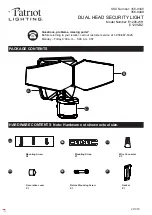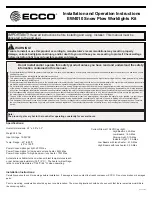
13
MAINTENANCE
GENERAL MAINTENANCE
The tool may be cleaned most effectively with compressed dry air. Always
wear safety goggles when cleaning tools with compressed air.
Avoid using solvents when cleaning plastic parts. Most plastics are
susceptible to damage from various types of commercial solvents and may be
damaged by their use. Use clean cloths to remove dirt, dust, oil, grease, etc.
WARNING!
Do not at any time let brake fluid, gasoline, petroleum-based prod-
ucts, penetrating oils, etc. to come in contact with plastic parts. Chemicals can
damage, weaken or destroy plastic which may result in serious personal injury.
Only the parts shown in the parts list are intended to be repaired or replaced
by the customer. All other parts should be replaced at a Service Center.
BATTERIES:
The battery pack is equipped with Lithium-Ion rechargeable batteries. The
duration of use from each charge will depend on the type of work performed.
The batteries in this tool have been designed to provide maximum trouble-
free life. Like all batteries, they will eventually wear out. Do not disassemble
the battery pack or attempt to replace the batteries. Handling of the batteries,
especially when wearing rings and jewelry could result in a serious burn.
To obtain the longest possible battery life, read and understand the operator’s
manual.
It is good practice to unplug the Charger/Adapter and remove the Lithium-
Ion battery pack when not in use.
For Lithium-Ion battery pack storage longer than 30 days:
Store the Lithium-Ion battery pack where the temperature is below 80°F
(26°C) and free of moisture.
Store Lithium-Ion battery packs in a 30%-50% charged
condition.
Every six months of storage, fully charge the Lithium-Ion
battery pack.
Exterior may be cleaned with a cloth or soft non-metallic
brush.
BATTERY PACK REMOVAL AND PREPARATION FOR RECYCLING
To preserve natural resources, please recycle or dispose of batteries
properly. This product contains lithium-ion batteries. Local, state, or federal
laws may prohibit disposal of lithium-ion batteries in ordinary trash. Consult
your local waste authority for information regarding available recycling and/
or disposal options.

































